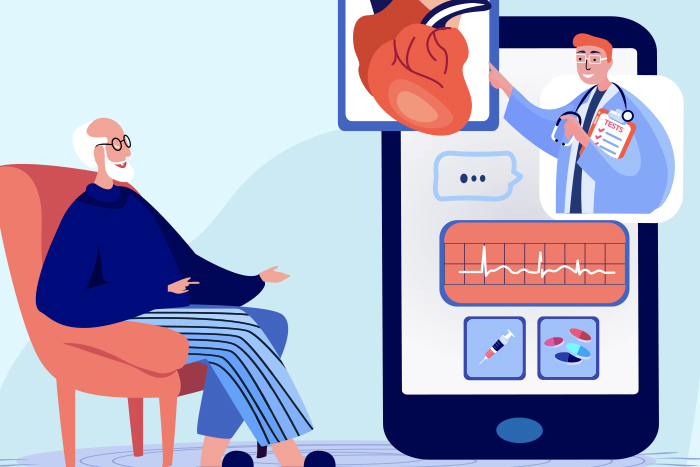What You Need to Know About Heart Problems
Your heart is one of the most important organs in your body. It pumps blood, delivers oxygen, and keeps everything running smoothly. But like any part of the body, it can have problems. Heart disease is very common, especially as we age. The good news? Many heart problems can be prevented or managed with a few smart steps.
In this article, we’ll explain the basics of heart health, go over common conditions like heart attacks and strokes, and share easy-to-follow tips to keep your heart strong.
What is heart disease?
Heart disease refers to a group of problems that affect the heart and blood vessels. Some of the most common types include:
Coronary Artery Disease (CAD): This is when the blood vessels that carry blood to your heart become blocked or narrowed. It’s a leading cause of heart attacks.
Heart Attack: A heart attack happens when blood flow to the heart is blocked, often by a blood clot. This can damage or even stop the heart.
Heart Failure: This doesn’t mean the heart stops, but it can’t pump blood as well as it should.
Arrhythmia: This is when your heart beats too fast, too slow, or irregularly.
Stroke: A stroke happens when blood flow to part of the brain is blocked or a blood vessel bursts. Strokes are often related to heart problems.
Congenital Heart Disease: This refers to heart problems that some people are born with.
What causes heart problems?
There are several things that can raise your risk of heart disease:
High blood pressure
High cholesterol
Smoking
Lack of exercise
Poor diet (especially one high in salt, sugar, and saturated fat)
Diabetes
Family history of heart disease
Being overweight
Excessive alcohol use
As we age, our risk for heart disease increases. That’s why it’s so important to take care of your heart—especially after age 65.
Signs and Symptoms to Watch For
The earlier you notice something might be wrong, the better your chances of getting treatment that can help. Here are some warning signs:
Chest pain or discomfort
Shortness of breath
Pain in the neck, jaw, back, or arms
Feeling dizzy or lightheaded
Fatigue (feeling very tired)
Breaking out into a cold sweat
Irregular heartbeat or palpitations
Swelling in the legs, feet, or ankles
For women, symptoms may be different and sometimes more subtle. In addition to chest pain, women are more likely to experience:
Unusual tiredness
Nausea or vomiting
Pain in the back, neck, or jaw
Dizziness or lightheadedness
Shortness of breath without chest pain
Because symptoms differ for women, they sometimes wait longer to get help. If you're worried about your heart, don't wait – get it checked out quickly.
For strokes, remember the signs with the word FAST:
Face drooping
Arm weakness
Speech difficulty
Time to call 911
If you ever feel any of these symptoms, especially chest pain or sudden numbness, get help right away. This could include calling 911 or pressing the emergency button if you wear a medical alert device.* Quick action can save your life.
Simple Ways to Keep Your Heart Healthy
You don’t need to make huge changes to protect your heart. Start small. Here are some easy and effective tips:
Eat Heart-Healthy Foods: Focus on fruits, vegetables, whole grains, and lean protein. Try to cut back on salt and added sugars.
Get Moving: Aim for 30 minutes of light activity most days. Walking, gardening, or gentle stretching all help.
Quit Smoking: This is one of the best things you can do for your heart.
Manage Stress: Deep breathing, talking to friends, and hobbies can help lower your stress.
Control Your Numbers: Keep an eye on your blood pressure, cholesterol, and blood sugar with regular checkups.
Get Good Sleep: Aim for 7-8 hours of quality sleep per night.
When to Talk to Your Doctor
Don’t wait for a crisis. It’s a good idea to talk to your doctor about your heart health even if you feel fine. Ask about:
Your blood pressure and cholesterol levels
What kind of exercise is safe for you
If you should be on any heart medications
How often you should be screened for heart problems
Keep Your Heart in Good Hands
Taking care of your heart doesn’t have to be hard. With a little knowledge and a few small changes, you can help prevent heart problems and feel your best. Talk to your doctor, listen to your body, and take each day one step at a time. Your heart will thank you.
Sources:
National Institute on Aging (NIA): Heart Health and Aging
American Heart Association: Heart Attack
American Stroke Association: About Stroke
*Disclaimer: Healthcare Select may earn a commission if you purchase a product or service through links to our partners. This comes at no extra cost to you.

